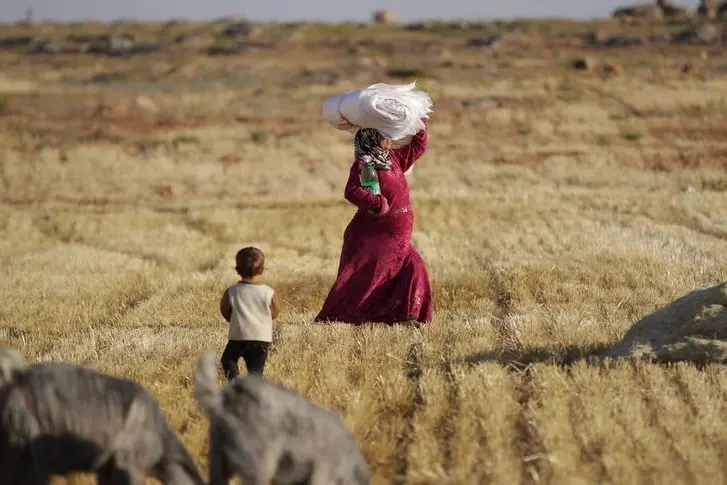PHOTO
AMMAN, May 17 (Reuters) - Syria's government has raised the price it pays farmers for their wheat to 140 pounds ($0.27) a kilo as the procurement season begins to offset higher production costs as conflict continues in grain producing areas.
The new price, made in a cabinet meeting late on Tuesday, is 12 percent higher than the 125 Syrian pounds ($0.24) announced in December.
The Damascus government subsidies bread for areas it controls and aid agencies offer supported prices in other areas. Subsidised bread has long been a main staple for Syrians.
But the country which was once self-sufficient in wheat production under a state-promoted policy has seen production slashed since the start of the conflict.
Continued fighting in the main grain producing areas in northeastern Syria and poor rainfall halved the nation's harvest last year to 1.3 million tonnes, the lowest in 27 years.
Agriculture officials have said that as the army gains more control, more arable agricultural land will fall back under state control.
The government has said it collected 400,000 tonnes of the 1.3 million tonnes that the United Nations estimated that Syria produced last year.
Perilous transport routes have meant that Syrian state has struggled to buy from traditional bread basket areas which lie outside government control.
The Kurdish-led authorities that control northeastern Syria have sought to keep the grain in their region to secure its needs. In rebel-held areas, many farmers have sold their grain to foreign NGO's who operate bakeries to supply the local population. ($1=517 Syrian pounds)
(Reporting by Suleiman Al-Khalidi; Editing by Tom Perry and Louise Heavens) ((suleiman.al-khalidi@thomsonreuters.com; +962 79 5521407; Reuters Messaging: suleiman.al-khalidi.reuters.com@thomsonreuters.net))
The new price, made in a cabinet meeting late on Tuesday, is 12 percent higher than the 125 Syrian pounds ($0.24) announced in December.
The Damascus government subsidies bread for areas it controls and aid agencies offer supported prices in other areas. Subsidised bread has long been a main staple for Syrians.
But the country which was once self-sufficient in wheat production under a state-promoted policy has seen production slashed since the start of the conflict.
Continued fighting in the main grain producing areas in northeastern Syria and poor rainfall halved the nation's harvest last year to 1.3 million tonnes, the lowest in 27 years.
Agriculture officials have said that as the army gains more control, more arable agricultural land will fall back under state control.
The government has said it collected 400,000 tonnes of the 1.3 million tonnes that the United Nations estimated that Syria produced last year.
Perilous transport routes have meant that Syrian state has struggled to buy from traditional bread basket areas which lie outside government control.
The Kurdish-led authorities that control northeastern Syria have sought to keep the grain in their region to secure its needs. In rebel-held areas, many farmers have sold their grain to foreign NGO's who operate bakeries to supply the local population. ($1=517 Syrian pounds)
(Reporting by Suleiman Al-Khalidi; Editing by Tom Perry and Louise Heavens) ((suleiman.al-khalidi@thomsonreuters.com; +962 79 5521407; Reuters Messaging: suleiman.al-khalidi.reuters.com@thomsonreuters.net))





















